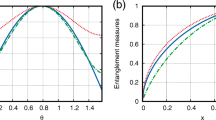Abstract
Entanglement is a resource for quantum computation and information tasks. It has increasingly become clear that entanglement may be brought forth in combination of concepts as “(the) Animal Acts” or “Animal (eats) Food” rather than being unique to micro-physical systems like photons or electrons. We extend the approach to the combination of three concepts which determine non-classical statistical correlations. Moreover, we introduce a new vector encoding algorithm that takes entanglement into account.
Similar content being viewed by others
References
Dalla Chiara, M.L., Giuntini, R., Leporini, R., Sergioli, G.: Quantum Computation and Logic. How quantum computers have inspired logical investigations. Trends Logic. Springer, Zurich, 48 1–178. ISBN 978-3-030-04470-1 (2018)
Leporini, R.: Holistic and Compositional Logics Based on the Bertini Gate. Found. Sci. 27(1), 57–75 (2022)
Leporini, R.: Quantum uncertainties and holism seem to render irrelevant qudit-semantics. Entropy 23(6), 735 (2021). https://doi.org/10.3390/e23060735
Dalla Chiara, M.L., Giuntini, R., Leporini, R., Sergioli, G.: A first-order epistemic quantum computational semantics with relativistic-like epistemic effects. Fuzzy Sets Syst. 298, 69–90 (2015). https://doi.org/10.1016/j.fss.2015.09.002
Aerts, D., Aerts Arguëlles, J., Beltran, L., Geriente, S., Sozzo, S.: Entanglement in Cognition violating Bell inequalities beyond Cirel’son’s bound. arXiv:2102.03847v1 (2021), 1–22.https://doi.org/10.48550/arXiv:2102.03847
Aerts, D., Sozzo, S.: Quantum structure in cognition: Why and how concepts are entangled. Lect. Notes Comput. Sci. 7052, 116–127 (2011)
Aerts, D., Sozzo, S.: Quantum entanglement in concept combinations. Int. J. Theor. Phys. 53, 3587–3603 (2014)
Bruza, P., Kitto, K., Ramm, B., Sitbon, L.: A probabilistic framework for analysing the compositionality of conceptual combinations. J. Math. Psychol. 67, 26–38 (2015)
Gronchi, G., Strambini, E.: Quantum cognition and Bell’s inequality: a model for probabilistic judgment bias. J. Math. Psychol. 78, 65–75 (2017)
Beltran, L., Geriente, S.: Quantum entanglement in corpuses of documents. Found. Sci. 24, 227–246 (2019)
Aerts, D., Beltran, L., Geriente, S., Sozzo, S.: Quantum-theoretic modeling in computer science. Int. J. Theor. Phys. 60, 710–726 (2021)
Bell, J.: On the Einstein Podolsky Rosen paradox. Physics 1, 195–200 (1964)
Clauser, J.F., Horne, M.A., Shimony, A., Holt, R.A.: Proposed experiment to test local hidden-variable theories. Phys. Rev. Let. 23, 880–884 (1969)
Accardi, L., Fedullo, A.: On the statistical meaning of the complex numbers in quantum mechanics. Nuovo Cimento 34, 161–172 (1969)
Das, A., Datta, C., Agrawal, P.: New Bell inequalities for three-qubit pure states. Phys. Lett. A. 381(47), 3928–3933 (2017)
Heinzerling, B., Strube, M.: BPEmb: tokenization-free Pre-trained subword embeddings in 275 languages. arXiv:1710.02187v1 1–5 (2017) .https://doi.org/10.48550/arXiv.1710.02187
Acknowledgements
All authors have read and agreed to the published version of the manuscript.
Author information
Authors and Affiliations
Contributions
Conceptualization, C.B., R.L.; methodology, C.B.; software, R.L.; validation, S.M.; formal analysis, R.L.; writing-original draft preparation, R.L.; writing-review and editing, S.M.
Corresponding author
Ethics declarations
Conflicts of interest
The authors declare no conflict of interest.
Additional information
Publisher's Note
Springer Nature remains neutral with regard to jurisdictional claims in published maps and institutional affiliations.
All authors contributed equally to this work.
Rights and permissions
Springer Nature or its licensor (e.g. a society or other partner) holds exclusive rights to this article under a publishing agreement with the author(s) or other rightsholder(s); author self-archiving of the accepted manuscript version of this article is solely governed by the terms of such publishing agreement and applicable law.
About this article
Cite this article
Bertini, C., Leporini, R. & Moriani, S. Quantum Entanglement and Encoding Algorithm. Int J Theor Phys 62, 149 (2023). https://doi.org/10.1007/s10773-023-05394-w
Received:
Accepted:
Published:
DOI: https://doi.org/10.1007/s10773-023-05394-w




